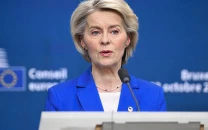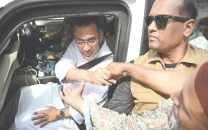UN Assembly extends UNSC reform talks
Pakistan urges push for narrowing differences
1723626381-0/BeFunky-collage]____-(92)1723626381-0-640x480.webp)
The United Nations General Assembly Tuesday unanimously decided that the long-running intergovernmental negotiations (IGN) on restructuring the UN Security Council will continue during its upcoming 79th session, with Pakistan calling the process "the most appropriate platform" to pursue 15-member body's reform.
"We welcome the adoption of the oral decision today to 'roll over' the negotiations on Security Council reform within the IGN process," Ambassador Usman Jadoon, deputy permanent representative of Pakistan to the UN, told the 193-member Assembly after the vote.
With the aim of "instilling new life" into the discussions on Security Council reform, the General Assembly further decided to include in its next session's agenda the item entitled "Question of equitable representation on and increase in the membership of the Security Council and other matters related to the Security Council".
Meanwhile, UN Secretary-General Antonio Guterres said he "very much hopes that member states, in their wisdom, will bring the process of Security Council reform to a result".
The UN chief "has been extremely vocal, especially lately, on the need for reform, notably on the need to find a (permanent) seat for an African country on the Security Council," his spokesperson Stephane Dujarric said in response to a question at the regular noon briefing at UN Headquarters in New York.
Full-scale negotiations to reform the Security Council began in the General Assembly in February 2009 on five clusters the categories of membership, the question of veto, regional representation, size of an enlarged Security Council, and working methods of the council and its relationship with the General Assembly.
Despite a general agreement on enlarging the Council, as part of the UN reform process, member states remain divided over the details.
The so-called Group of Four - India, Brazil, Germany and Japan - who seek for themselves permanent seats on the Council have shown no flexibility in their push for expanding the Council by 10 seats, with six additional permanent and four non-permanent members.
On the other hand, the Italy/Pakistan-led Uniting for Consensus (UfC) group, which firmly opposes additional permanent members, has proposed a new category of members - not permanent members - with longer duration in terms and a possibility to get re-elected.
The Security Council is currently composed of five permanent members - Britain, China, France, Russia and the United States - and 10 non-permanent members elected to serve for two years.






1726734110-0/BeFunky-collage-(10)1726734110-0-208x130.webp)












COMMENTS
Comments are moderated and generally will be posted if they are on-topic and not abusive.
For more information, please see our Comments FAQ